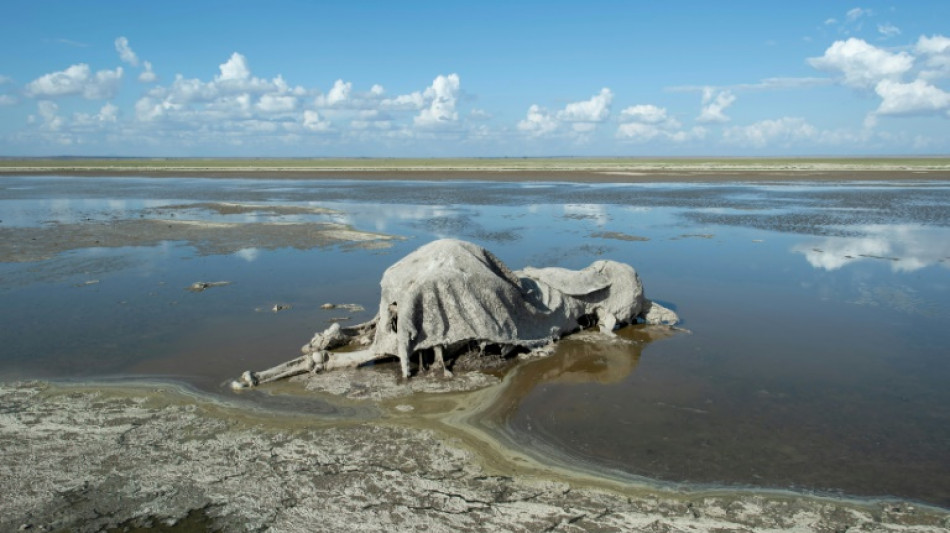
-
 India readies for 400 million pilgrims at mammoth festival
India readies for 400 million pilgrims at mammoth festival
-
Nepal hosts hot air balloon festival

-
 Asia stocks up as 'Santa Rally' persists
Asia stocks up as 'Santa Rally' persists
-
Tears, prayers as Asia mourns tsunami dead 20 years on

-
 Sydney-Hobart yacht crews set off on gale-threatened race
Sydney-Hobart yacht crews set off on gale-threatened race
-
Key public service makes quiet return in Gaza

-
 Fearless Konstas slams 60 as Australia take upper hand against India
Fearless Konstas slams 60 as Australia take upper hand against India
-
Bridges outduels Wembanyama, Celtics lose again

-
 Hungry Sabalenka ready for more Slam success
Hungry Sabalenka ready for more Slam success
-
Mass jailbreak in Mozambique amid post-election unrest

-
 Azerbaijani jet crashes in Kazakhstan, killing 38
Azerbaijani jet crashes in Kazakhstan, killing 38
-
Bridges outduels Wembanyama as Knicks beat Spurs

-
 2004 Indian Ocean tsunami: what to know 20 years on
2004 Indian Ocean tsunami: what to know 20 years on
-
Asia to mourn tsunami dead with ceremonies 20 years on

-
 Syrians protest after video of attack on Alawite shrine
Syrians protest after video of attack on Alawite shrine
-
Russian state owner says cargo ship blast was 'terrorist attack'

-
 38 dead as Azerbaijani jet crashes in Kazakhstan
38 dead as Azerbaijani jet crashes in Kazakhstan
-
Crisis-hit Valencia hire West Brom's Corberan as new boss

-
 Suriname ex-dictator and fugitive Desi Bouterse dead at 79
Suriname ex-dictator and fugitive Desi Bouterse dead at 79
-
35 feared dead as Azerbaijani jet crashes in Kazakhstan

-
 Pope calls for 'arms to be silenced' in Christmas appeal
Pope calls for 'arms to be silenced' in Christmas appeal
-
Syria authorities say torched 1 million captagon pills

-
 Pope calls for 'arms to be silenced' across world
Pope calls for 'arms to be silenced' across world
-
32 survivors as Azerbaijani jet crashes in Kazakhstan

-
 Pakistan air strikes kill 46 in Afghanistan, Kabul says
Pakistan air strikes kill 46 in Afghanistan, Kabul says
-
Liverpool host Foxes, Arsenal prepare for life without Saka

-
 Japan FM raises 'serious concerns' over China military buildup
Japan FM raises 'serious concerns' over China military buildup
-
Pope's sombre message in Christmas under shadow of war

-
 Zelensky condemns Russian 'inhumane' Christmas attack on energy grid
Zelensky condemns Russian 'inhumane' Christmas attack on energy grid
-
Sweeping Vietnam internet law comes into force

-
 Pope kicks off Christmas under shadow of war
Pope kicks off Christmas under shadow of war
-
Catholics hold muted Christmas mass in Indonesia's Sharia stronghold

-
 Japan's top diplomat in China to address 'challenges'
Japan's top diplomat in China to address 'challenges'
-
Thousands attend Christmas charity dinner in Buenos Aires

-
 Demand for Japanese content booms post 'Shogun'
Demand for Japanese content booms post 'Shogun'
-
As India's Bollywood shifts, stars and snappers click

-
 Mystery drones won't interfere with Santa's work: US tracker
Mystery drones won't interfere with Santa's work: US tracker
-
Djokovic eyes more Slam glory as Swiatek returns under doping cloud

-
 Australia's in-form Head confirmed fit for Boxing Day Test
Australia's in-form Head confirmed fit for Boxing Day Test
-
Brazilian midfielder Oscar returns to Sao Paulo

-
 'Wemby' and 'Ant-Man' to make NBA Christmas debuts
'Wemby' and 'Ant-Man' to make NBA Christmas debuts
-
US agency focused on foreign disinformation shuts down

-
 On Christmas Eve, Pope Francis launches holy Jubilee year
On Christmas Eve, Pope Francis launches holy Jubilee year
-
'Like a dream': AFP photographer's return to Syria

-
 Chiefs seek top seed in holiday test for playoff-bound NFL teams
Chiefs seek top seed in holiday test for playoff-bound NFL teams
-
Panamanians protest 'public enemy' Trump's canal threat

-
 Cyclone death toll in Mayotte rises to 39
Cyclone death toll in Mayotte rises to 39
-
Ecuador vice president says Noboa seeking her 'banishment'

-
 Leicester boss Van Nistelrooy aware of 'bigger picture' as Liverpool await
Leicester boss Van Nistelrooy aware of 'bigger picture' as Liverpool await
-
Syria authorities say armed groups have agreed to disband


Drought, floods and sickness: Key takeaways from UN's water report
Billions of people experience water-related issues on a daily basis -- from contaminated drinking water, to droughts and floods -- with a UN report warning Tuesday that the risk of a global crisis is "imminent."
Here are some key takeaways from the UN Water forum, which published its report as the first major conference on the issue in nearly a half-century is set to get underway Wednesday in New York.
- Shortages -
Global water consumption has increased by about 1 percent per year over the past four decades.
To meet that growing demand, humans have been tapping more and more into groundwater, resulting in the depletion of between 100-200 cubic kilometers (26-52 trillion gallons) of reserves each year.
About 10 percent of the world's population lives in a country where water stress (the ratio of water use to water availability) is considered "high or critical," creating significant impacts on its availability for personal needs.
And according to a report issued Monday by the IPCC -- a UN panel of climate experts -- "roughly half of the world's population currently experience severe water scarcity for at least part of the year."
The World Bank estimates that climate change-exacerbated water shortages could cost some regions up to six percent of GDP by 2050 due to impacts on agriculture, health, income, and potentially forced migration or even conflict.
- Cities v. agriculture -
Agriculture makes up more than 70 percent of global water usage, but as city populations have continued to grow, "water allocation from agriculture to urban centers has become a common strategy to meet freshwater needs," the UN said.
But that's not likely to be enough. The number of urban residents threatened by water scarcity is expected to rise from 933 million in 2016 to between 1.7 and 2.4 billion in 2050, according to UN-Water, which projects that India will experience the most severe effects.
- Natural disasters -
As the planet warms, humidity in the atmosphere increases by about seven percent with each additional degree Celsius. That in turn leads to more rainfall, which is more intense and less regular.
Between 2000 and 2019, floods are estimated to have caused $650 billion in damage, affected 1.7 million people and caused more than 100,000 deaths, according to the report.
Warming also intensifies and raises the frequencies of droughts, which over the same period affected 1.4 million people and caused $130 billion in damage.
Together, droughts and floods account for more than three-quarters of the natural disasters impacting humans.
- Sanitation and hygiene -
In 2020, over one in four people around the globe still lacked access to safe drinking water, while 3.6 billion (46 percent of the population) lacked access to safely managed sanitation services, including the nearly 500 million who must resort to "open defecation."
In addition, more than 40 percent of domestic wastewater was not treated safely before being released into the environment in 2020.
Twenty-nine percent of the world's population (2.3 billion people) lacked basic hygiene services, including 670 million without any handwashing facilities.
At least two billion people drink water which has been contaminated with feces -- which can contribute to the spread of diseases such as cholera, dysentery and polio.
In 2019, 1.4 million deaths are estimated to have been caused by the lack of adequate sanitation and hygiene services.
Worries are also growing over other kinds of pollutants, such as chemicals and pharmaceutical drugs, pesticides, or plastics and nanomaterials.
- Ecosystem damage -
Pollutants are also threatening freshwater ecosystems, which are particularly affected by agricultural runoff.
These fragile ecosystems are "among the most threatened in the world," the report says, while highlighting the disappearance of more than 85 percent of wetlands.
"The loss of environmental services and biodiversity is expected to continue as natural landscapes are lost to cultivated land," the report says, noting that these transitions can result in the emission of greenhouse gases.
- Major investments needed -
While it is difficult to put a precise number on how much investment would be needed to achieve the UN's sixth "Sustainable Development Goal" of ensuring access to clean water and sanitation for all by 2030, a study cited by the report estimates that it would cost more than $1 trillion per year.
Just providing safe drinking water by 2030 would require a tripling of current investment levels, the report says.
M.Fischer--AMWN



